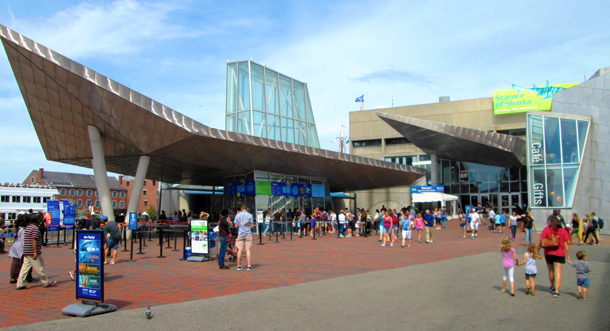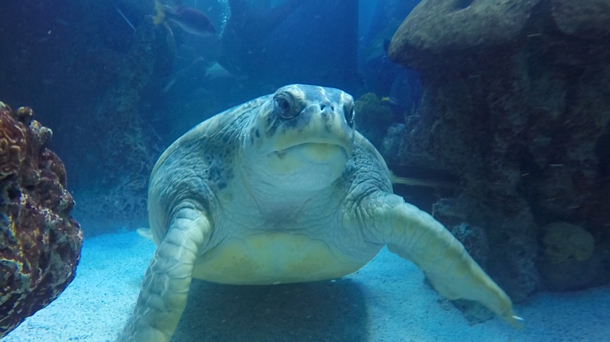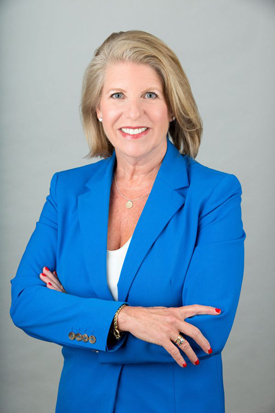Behind the Quarantine at the New England Aquarium
Air Date: Week of May 1, 2020

The entrance to the New England Aquarium on a summer day in 2017. With the current lockdown, no visitors have been to the aquarium since mid-March. (Photo: Wikimedia Commons, CC BY-SA 4.0)
Across the country, animal care facilities are facing the question of how to care for their animals without visitor revenue during the coronavirus shutdown. Vikki Spruill, the President and CEO of the New England Aquarium in Boston, joins Host Steve Curwood to explain how her staff is taking care of more than 20,000 animals during the lockdown.
Transcript
CURWOOD: To find out what it’s like to manage a major public aquarium when it suddenly shuts down with no clear end in sight, we turn now to Vikki Spruill. She’s president and CEO of the New England Aquarium in Boston. Vicki, welcome to Living on Earth!
SPRUILL: Hi, Steve, it's great to be here.
CURWOOD: First of all, where are you right now? And how are you dealing with social distancing?
SPRUILL: Well I, like millions of other Americans, am sitting in a makeshift home office in a suburb of Boston, Massachusetts, where I live.
CURWOOD: That's not your favorite place to be right now running an aquarium, I imagine.
SPRUILL: No, my favorite place would be to be downtown and to sneak over to the main building of our aquarium and stand there and watch all the kids with their noses to the glass, admiring our 20,000 animals. That's what I wish I was doing.
CURWOOD: 20,000 creatures.
SPRUILL: Yeah.
CURWOOD: And ranging in size from?
SPRUILL: Oh, itty bitty little fishes all the way up to our grande dame, Myrtle the turtle.
CURWOOD: So, with the aquarium closed during this pandemic crisis, how are the animals?
SPRUILL: So the animals are being cared for by an amazing team of aquarists and our animal care team. We have about 30 staff in the building now. They are considered essential personnel. And they go in there every day and continue to train and feed and take care of the medical needs of our wonderful animals. We're a little bit unusual as compared to other cultural institutions and museums in that when we close our doors, we still have to take care of the animals. And so, it's been quite challenging to figure it all out. But I'm also just deeply, deeply grateful, and impressed with the team that's pulled this together.

Myrtle the Turtle, a giant green turtle who resides in the New England Aquarium’s Giant Ocean Tank. (Photo: Courtesy of New England Aquarium)
CURWOOD: You've been posting some virtual visits from the aquarium, letting anyone who wants to spend some time in the company of your outfit from the safety of quarantine. How is it trying to transition to physical experiences, such as petting a stingray or feeling the splash of water as a little turtle swims by in some of those tables you have? How do you change that into a virtual experience?
SPRUILL: Well, it's funny when we closed, our members and our visitors, were asking the same question you asked, which is how are the animals, and we knew it would be important to keep that experience alive for them. And because we have staff there, already caring for the animals, we knew we could take that experience to them directly. So, we began to videotape and use our phones to share the everyday experiences that happen behind the scenes, as our staff is caring for the animals. And I, I don't think any of us expected to have the kind of reaction we've had. People have just loved it. And we locked into a regular slot every morning at 11 am. And, and then in the afternoon, we're creating an educational opportunity for kids that links back to what they saw that morning. And the numbers are through the roof in terms of followers and people who are signing up and watching every day, it's so heartening,
CURWOOD: Now, which are the animals, by the way, have noticed that they maybe are being streamed and are looking maybe for further acting roles.
SPRUILL: So, of course, there's Myrtle the turtle. She's been with us since almost the beginning of the aquarium, 50 years ago. And we're not quite sure how old she is, but we put her close to 90, and she rules the roost and still does, loving the camera and loving the attention.
CURWOOD: What are you missing the most from the aquarium right now? Is it those penguins waddling in the front? Is it the smell of fresh fish? What's going on?

Vikki Spruill is the President and CEO of the New England Aquarium. (Photo: Courtesy of New England Aquarium)
SPRUILL: I think I miss the visitors. I miss the animals, but I see them through our virtual programming. I know they're being well taken care of. I miss our visitors because that's the lifeblood of our institution. And, you know, 80% of our revenue is derived from our special events and from the visitors who come through the door. And so, it's a sobering moment when one's revenue source is completely shut down. And that's what's happening to us and to so many other businesses. And you know, typically if a crisis happens in one part of the country, say a storm or a hurricane or something, we're a very tight-knit network of institutions who help one another with taking the animals if we have a particular challenge and whatnot. This is a little different because we're all in the same boat. And I think that's why it's so important for all of us to be able to have the resources to continue to shelter our animals in place and take care of them.
CURWOOD: So, it's been a very tough time. Tell me about a moment where it wasn't so tough. It was, in fact, maybe wonderful.
SPRUILL: That moment has to be when I went into the building after we'd closed, I went to thank our staff who are there, taking care of the animals. I was walking around the Giant Ocean Tank and Myrtle, our giant green turtle came and I swear she was looking at me. And I asked our Vice President for Animal Care who was with me if she thought the animals missed the people. And she said I think they might because they're so used to the human interaction that they have. And it was such a lovely moment to realize that this interaction between me and this, you know, an amazing turtle that we've cared for all these years, it was a connection. And it just made me realize and remember why I do what I do and why that beloved institution exists.
CURWOOD: Vikki Spruill is the CEO and President of the New England Aquarium. Vikki, thank you so much for taking the time with us today.
SPRUILL: Thank you, Steve.
CURWOOD: For links to the online tours and events hosted by the New England Aquarium and the institutions Aynsley mentioned earlier visit the living on earth website, loe.org
Links
Living on Earth wants to hear from you!
Living on Earth
62 Calef Highway, Suite 212
Lee, NH 03861
Telephone: 617-287-4121
E-mail: comments@loe.org
Newsletter [Click here]
Donate to Living on Earth!
Living on Earth is an independent media program and relies entirely on contributions from listeners and institutions supporting public service. Please donate now to preserve an independent environmental voice.
NewsletterLiving on Earth offers a weekly delivery of the show's rundown to your mailbox. Sign up for our newsletter today!
 Sailors For The Sea: Be the change you want to sea.
Sailors For The Sea: Be the change you want to sea.
 The Grantham Foundation for the Protection of the Environment: Committed to protecting and improving the health of the global environment.
The Grantham Foundation for the Protection of the Environment: Committed to protecting and improving the health of the global environment.
 Contribute to Living on Earth and receive, as our gift to you, an archival print of one of Mark Seth Lender's extraordinary wildlife photographs. Follow the link to see Mark's current collection of photographs.
Contribute to Living on Earth and receive, as our gift to you, an archival print of one of Mark Seth Lender's extraordinary wildlife photographs. Follow the link to see Mark's current collection of photographs.
 Buy a signed copy of Mark Seth Lender's book Smeagull the Seagull & support Living on Earth
Buy a signed copy of Mark Seth Lender's book Smeagull the Seagull & support Living on Earth

